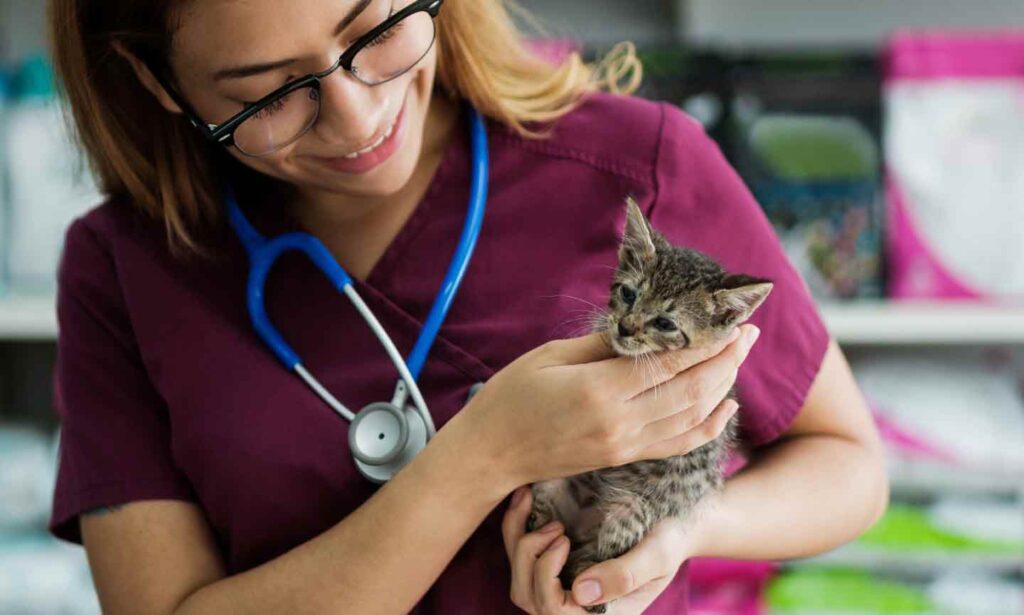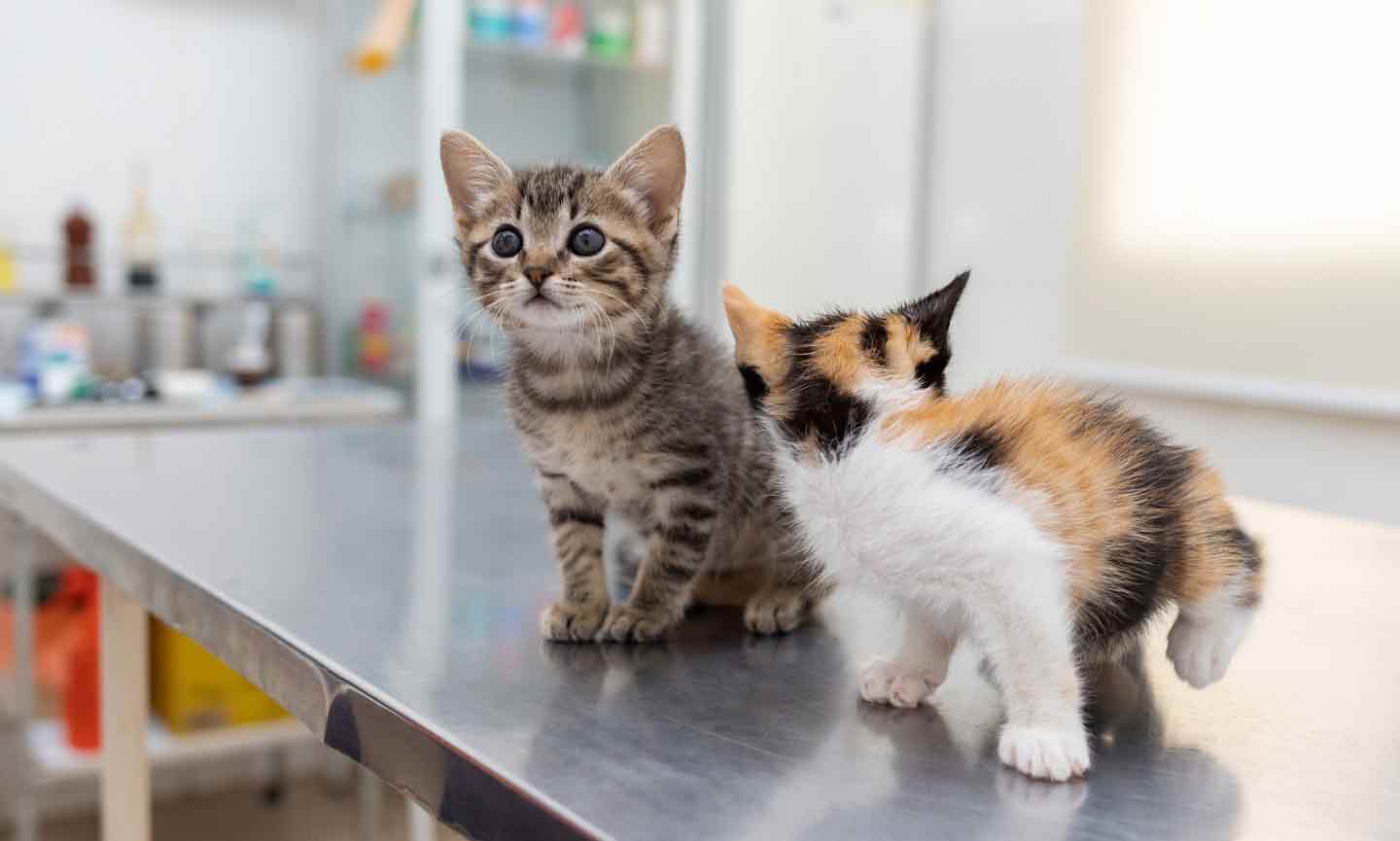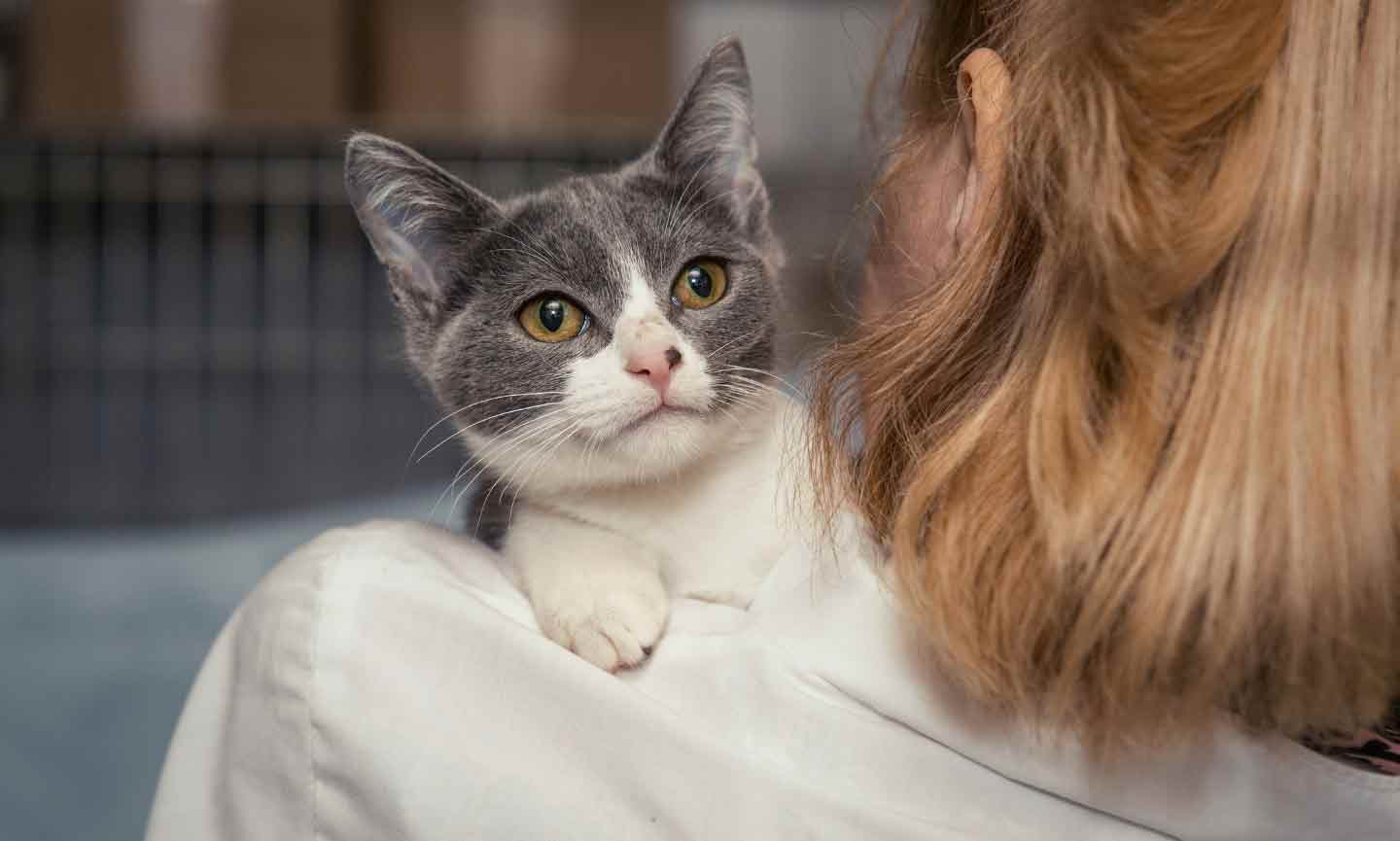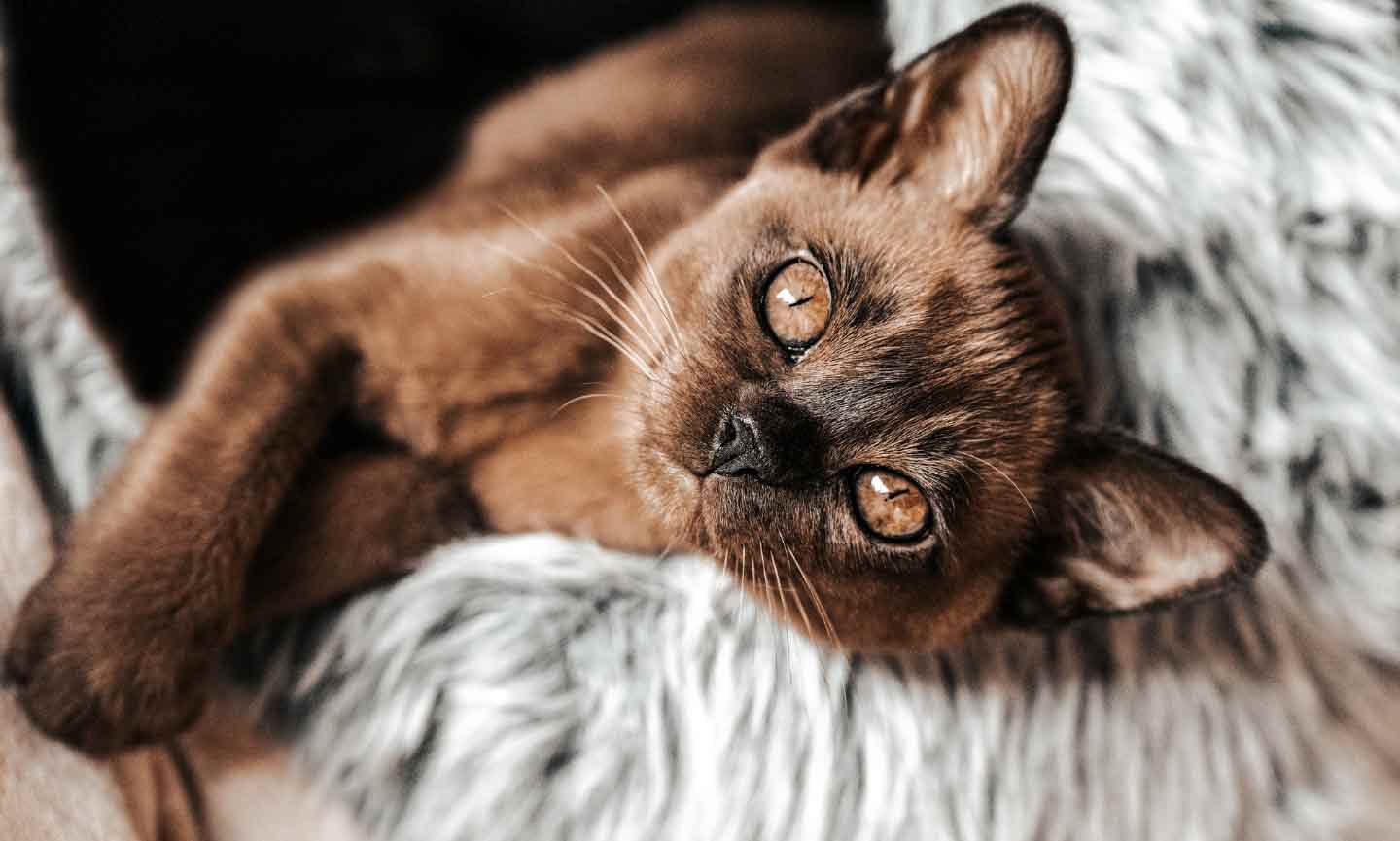FeLV/FIV Testing in Cats: Everything You Need to Know

Photo by iStock.com/aldomurillo
Every cat parent wants their kitty to be happy and healthy. So, if you’ve heard about Feline Leukemia Virus (FeLV) and Feline Immunodeficiency Virus (FIV), two common infectious diseases in cats, you might feel afraid for your furry friend. Here’s the good news: Understanding these viruses and their testing procedures is the first step to keeping your cat healthy. That’s why we’ve rounded up everything you need to know about FeLV/FIV testing, diagnosis and treatment in cats.
What Is FeLV?
Feline Leukemia Virus (FeLV) is a feline retrovirus that can affect cats of all ages. A retrovirus is virus that uses RNA as its genetic material, rather than DNA.
The virus spreads through exposure to bodily fluids, including:
- Saliva
- Urine
- Feces
- The milk of an infected mother cat
- From mother to kitten during birth
FeLV used to be called the ‘loving disease’ because it was believed that cats could become infected after touching noses with other cats. However, it is now known that FeLV can also be passed through bite wounds.
Symptoms of FeLV
Signs of infection can vary widely, but may include:
- Pale gums
- Lethargy from anemia (low red blood cell count)
- Weight loss
Infected cats may also have an increased risk of bone marrow suppression, which can predispose them to developing other infectious diseases, and various cancers, including lymphoma.
How Is FeLV Treated?
FeLV-positive cats may require medical treatment, supportive care or other management options, depending on their clinical signs and overall health. Treatment may include:
- Antiviral medications
- Immune system support, including high-quality nutrition and vaccination with inactivated vaccines
- Regular monitoring for signs of worsening health
- Regular dental care to prevent dental infections
FeLV-positive cats should be separated from non-infected cats to prevent the spread of infection. The good news is that many cats with FeLV can still live relatively healthy, happy lives with the right care.
How Can I Prevent FeLV Infection in My Cat?
There is a vaccine available that can help prevent FeLV, and it is recommended for all kittens and cats who are at high risk of infection, such as outdoor cats. If your cat is indoor only, then their risk is very low and you may not need FeLV vaccination. Talk with your veterinarian about your cat’s risks.

iStock.com/Thais Ceneviva
What Is FIV?
Feline Immunodeficiency Virus (FIV) is another retrovirus that affects cats, but it is different from FeLV in a number of ways. One of the biggest ones: the number of ways it’s transmitted. While FeLV is commonly spread in numerous ways, FIV is primarily spread through bite wounds from an infected cat, typically during fights between outdoor cats. FIV can affect any cat, but it is most commonly diagnosed in outdoor, unneutered male cats who fight.
Symptoms of FIV
Signs of FIV infection may include:
- Fever
- Anemia
- Immune system suppression
However, some cats may not show any symptoms at all.
How Is FIV Treated?
For FIV-positive cats, there is currently no cure for the infection. However, FIV-positive cats can still live long and healthy lives with proper management. FIV-positive cats should be kept indoors, as they are more susceptible to infections from other cats. FIV-positive cats are at higher risk for dental infections, and should receive regular dental care from a veterinarian.
How Can I Prevent FIV Infection in My Cat?
Unlike FeLV, there is no vaccine available for FIV. The best method of prevention is keeping your cat away from outdoor, free-roaming cats, who have the highest likelihood of infection.

iStock.com/Okssi68
When Should a Cat Be Tested for FeLV/FIV?
Because these viral diseases are fairly common, blood tests have been developed to diagnose them. These tests are relatively inexpensive ($40-$55 USD) and can often be run right in your vet’s office while you wait.
There could be several times in your cat’s life when your veterinarian will recommend testing:
- At an adult cat’s first veterinary visit, or if your cat has not been previously tested. If you have taken in a stray adult cat, for example, your vet may want to test them, in accordance with the American Association of Feline Practitioners’ (AAFP) recommendation.
- When your cat is sick. Testing when your cat is unwell, especially if they are showing symptoms of either illness like weight loss, lethargy, anemia, or infections, can help your vet diagnose FIV or FeLV infection. Alternately, it can allow them to rule it out so they can determine the real cause of the illness.
- Annually, for outdoor cats. If your cat goes outdoors, or fights with other cats, your veterinarian may recommend yearly testing for both FeLV/FIV.
- If you are bringing home a cat sibling for your other kitties. If you are adopting a new cat into a household where cats already live, testing is essential before introducing the new cat to your other cats.
- If your cat has been exposed to FeLV/FIV positive cats. This one’s a no-brainer—if your cat was exposed to these viruses, it’s important to find out whether they’ve been infected.
Kittens can be tested at six to eight weeks of age. However, maternal antibodies may interfere with the test when kittens are that young, so, they should be retested at around 6 months of age to ensure they are still negative.
Even with adult cats, veterinarian swill sometimes recommend running a FeLV/FIV test again, even for cats who have tested negative recently. This is because cats can have false negative test results in the early phases of infection before they develop antibodies or antigens in their blood.✓
When Not to Test
There are also some cases where FeLV/FIV testing is not recommended, according to the AAFP. These include cats who:
- live in free-roaming or feral communities
- are part of trap-neuter-release programs (TNR)
Why not these cats? Because, while these cats are susceptible to FeLV and FIV, shelter and rescue organizations who manage colonies of feral cats find that sterilization and vaccination efforts are more supportive of the cats’ overall health, and therefore more deserving of animal organizations’ limited resources. Find out more about TNR and other community cat programs.

iStock.com/frankiefotografie
How Are Cats Tested for FeLV/FIV?
The testing procedure for FeLV and FIV is very simple: Veterinary care staff draw a blood sample from your cat, then test that sample for evidence of FeLV/FIV infection. The most common antibody test for FIV and FeLV is the Idexx SNAP test, sometimes referred to as an ELISA (Enzyme-Linked Immunosorbent Assay) test.
- For FeLV testing, the blood test can detect the presence of FeLV antigens, which are viral molecules that stimulate an immune response. A positive result is considered a screening test or a preliminary positive, and additional testing is required to confirm the diagnosis. (More on that additional testing is below.)
- For FIV, the blood test can detect the presence of FIV antibodies produced by the cat’s immune system in response to the virus. A positive result is also considered a preliminary positive, and confirmatory testing is also required. (More on that below, too.)
Often, your veterinarian can run the diagnostic test in their clinic while you wait. In-house testing takes about 15-20 minutes. Other times, a veterinarian may choose to have the blood sample sent to a laboratory, in which case, you will get results in a day or two.
What Happens If My Cat Tests Positive?
If your cat tests positive for either FeLV or FIV, don’t panic. No test is 100% accurate. Sometimes, cats can get what is called a false positive test result, when they test positive but don’t actually have the disease. False positive results can occur if the test is not run correctly, if the cat has been vaccinated against either illness, or if antigens have passed to the kitten from their mother’s milk.
Since a positive FeLV or FIV screening test result has potentially important consequences, additional testing is recommended, especially in cats who have a low risk of infection, such as indoor-only cats or apparently healthy cats.
My Cat Tested Positive for FeLV—Now What?
If your cat tests positive for FeLV, your veterinarian will recommend level 2 testing, which involves sending your cat’s blood to a laboratory for further analysis. Typically, second level testing involves either:
- FeLV PCR testing, which detects bits of the virus in a cat’s blood
- Reference laboratory microtiter antigen test, another method of testing for the virus in a cat’s blood
- Indirect fluorescent antibody (IFA) test, which tests for antibodies in a cat’s blood
If your cat tests positive on any (or all) of these tests, infection with FeLV is confirmed.
If your cat gets negative results from the tests, infection is still unclear. If your cat is healthy, your veterinarian will likely recommend that you keep them indoors, away from other cats, and retest in one month. If your cat is sick, your veterinarian will likely recommend additional testing immediately for other diseases, or may recommend additional testing for FeLV. It is especially important to keep a sick cat who has tested positive for FeLV away from other cats, even if their level 2 tests came back negative, as there is still a chance they can infect other cats with FeLV or whatever other illness is making them sick.
My Cat Tested Positive for FIV—Now What?
If your cat tests positive for FIV, your veterinarian will also recommend level 2 testing, which involves sending your cat’s blood to a laboratory for further analysis. Typically, second level testing involves either:
- FIV PCR testing, which detects bits of the virus in a cat’s blood
- Western blot, which tests for antibodies in a cat’s blood
If your cat tests positive of any (or all) of these tests, infection with FIV is confirmed.
If your cat tests negative, infection is still unclear. If your cat is healthy, your veterinarian may recommend that you keep the cat indoors, away from other cats, and retest in 60 days. If your cat is sick, your veterinarian will likely recommend additional testing immediately for other diseases, or may recommend additional testing for FIV. Just as with unclear FeLV tests, it is especially important to keep a sick cat who has tested positive for FIV away from other cats, even if their level 2 tests came back negative, as there is still a chance they can infect other cats with FIV or whatever other illness is making them sick.
FeLV/FIV in Cats: Main Takeaways
- Testing positive for FeLV and/or FIV is not a death sentence. Many cats live long, happy lives after infection.
- False positive test results can occur, and confirmatory testing is necessary.
- Cats who test positive need to stay indoors and have higher susceptibility to all kinds of infections, including dental infections.
- Cats who test positive are contagious to other cats and need to be isolated from cats who do not have FIV/FeLV to prevent spread of infection.
If you suspect your cat or kitten is infected with FeLV or FIV, it’s time to call your veterinarian. These tips can make vet visits less stressful for you both.



